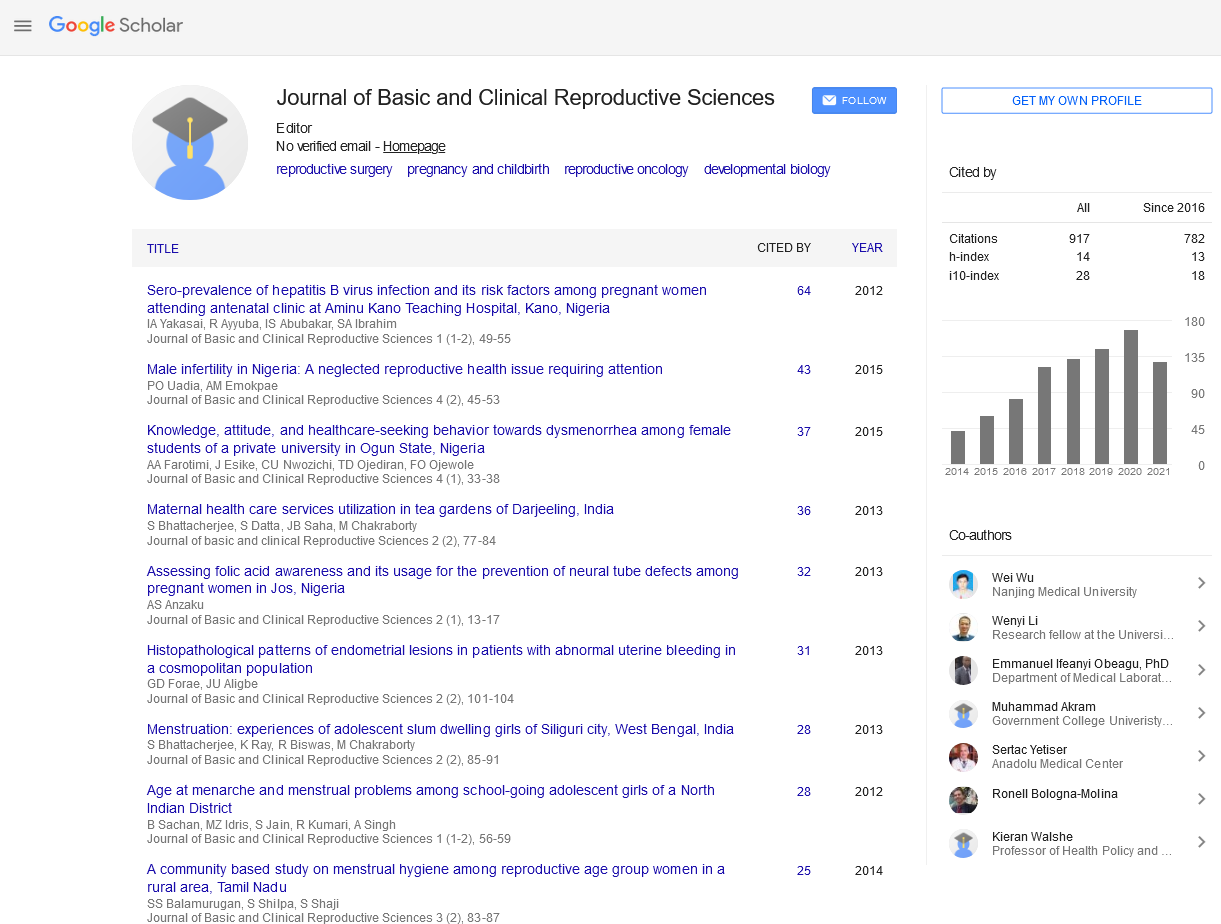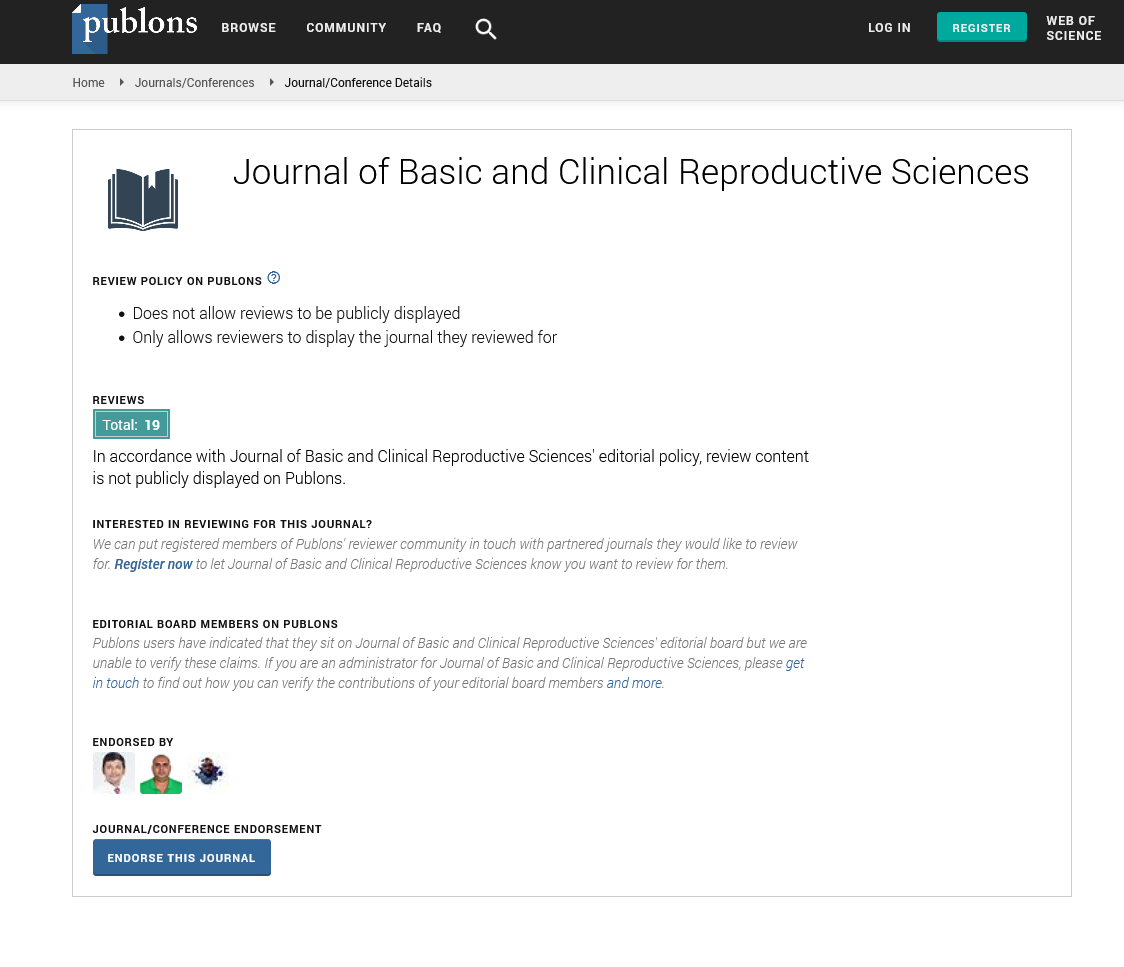Perspective - Journal of Basic and Clinical Reproductive Sciences (2023) Volume 12, Issue 1
Oncofertility A Magnificent Cooperation Between Reproductive Medicine and Oncology
Received: 10-Jan-2023, Manuscript No. JBCRS-23-92186; Editor assigned: 12-Jan-2023, Pre QC No. JBCRS-23-92186; Accepted Date: Feb 10, 2023 ; Reviewed: 23-Jan-2023 QC No. JBCRS-23-92186; Revised: 03-Feb-2023, Manuscript No. JBCRS-23-92186; Published: 10-Feb-2023
This open-access article is distributed under the terms of the Creative Commons Attribution Non-Commercial License (CC BY-NC) (http://creativecommons.org/licenses/by-nc/4.0/), which permits reuse, distribution and reproduction of the article, provided that the original work is properly cited and the reuse is restricted to noncommercial purposes. For commercial reuse, contact reprints@pulsus.com
Abstract
Description
Oncofertility is a field of medicine that focuses on the fertility preservation options available to cancer patients before undergoing treatments that may negatively affect their fertility. Many cancer treatments, such as chemotherapy, radiation therapy, and surgery, can damage the reproductive organs and cause infertility. Oncofertility provides cancer patients with options to preserve their fertility, including sperm banking, embryo freezing, oocyte (egg) freezing, and ovarian tissue cryopreservation. Oncofertility also involves researching and developing new methods to preserve fertility and improve the success rates of these procedures. The field is interdisciplinary, involving collaboration between oncologists, fertility specialists, reproductive endocrinologists, and other healthcare professionals. The goal of oncofertility is to empower cancer patients to make informed decisions about their reproductive health and to provide them with the resources and support necessary to preserve their fertility and achieve their future reproductive goals. Reproductive medicine and oncology are two distinct fields in medicine, but there is an overlap between them when it comes to the impact of cancer and cancer treatments on reproductive health.
Reproductive medicine deals with the prevention, diagnosis, and treatment of reproductive disorders and infertility. It includes Assisted Reproductive Technologies (ART) such as in vitro fertilization (IVF), ovulation induction, and sperm and egg donation. Reproductive medicine also involves the management of conditions such as Polycystic Ovary Syndrome (PCOS), endometriosis, and uterine fibroids. On the other hand, oncology is the branch of medicine that deals with the prevention, diagnosis, and treatment of cancer. It includes surgery, chemotherapy, radiation therapy, targeted therapy, and immunotherapy. The intersection of reproductive medicine and oncology arises when cancer and cancer treatments affect reproductive health. Some cancer treatments, such as chemotherapy and radiation therapy, can damage the reproductive organs and lead to infertility. In such cases, reproductive medicine can help preserve fertility before cancer treatment or restore fertility after treatment.
Reproductive medicine and oncology are two fields of medicine that may seem very different at first glance, but there is actually a growing overlap between the two. This intersection has resulted in some significant advancements in patient care and treatment options, and it is a prime example of how different fields of medicine can come together to create a more comprehensive and effective approach to healthcare. One of the most significant areas of cooperation between reproductive medicine and oncology is fertility preservation. Cancer treatments such as chemotherapy and radiation therapy can often cause damage to a patient’s reproductive organs and leave them infertile. However, with advances in reproductive medicine, it is now possible to preserve a patient’s fertility before undergoing cancer treatment. This may involve freezing eggs, sperm, or embryos, depending on the patient’s individual circumstances. Another area where these two fields intersect is in the treatment of certain types of cancer that affect the reproductive organs. For example, ovarian cancer can be treated with surgery to remove the affected ovary or ovaries. In some cases, it may be possible to preserve fertility by removing only the affected tissue and leaving the remaining healthy tissue intact. Additionally, certain types of cancer can be treated with medications that have the potential to damage a patient’s reproductive organs. In these cases, reproductive medicine specialists may be able to prescribe medications to help protect the patient’s fertility. The collaboration between reproductive medicine and oncology has also led to advancements in genetic testing and counseling. Some types of cancer have a genetic component, and patients may want to know if they are at increased risk of developing cancer in the future or passing the gene mutation on to their children. Reproductive medicine specialists can work with oncologists to provide genetic testing and counseling services to patients and their families. The cooperation between reproductive medicine and oncology has led to significant advancements in fertility preservation, treatment of reproductive organ cancers, and genetic testing and counseling. This partnership demonstrates the importance of collaboration between different fields of medicine and the potential benefits it can bring to patient care and treatment options.


